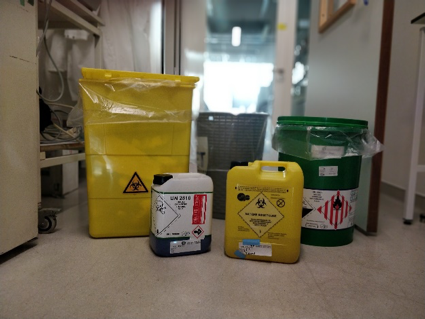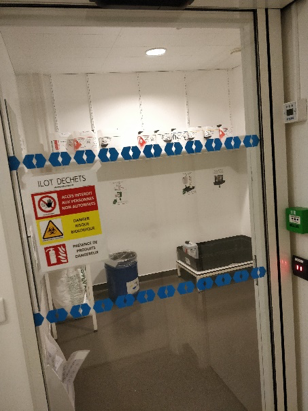Kelly trang (Talk | contribs) |
|||
| (3 intermediate revisions by one other user not shown) | |||
| Line 28: | Line 28: | ||
} | } | ||
| − | |||
| − | |||
| − | |||
</style> | </style> | ||
| Line 156: | Line 153: | ||
It is also important to note that ethical rules can have different sources such as State, committees, scientific panel, etc. | It is also important to note that ethical rules can have different sources such as State, committees, scientific panel, etc. | ||
As our project aims to enhance the living conditions of amputees, it is closely linked to human health. Research on human beings includes the use of biological samples, psychological studies, personal data, interviews, observations, etc. | As our project aims to enhance the living conditions of amputees, it is closely linked to human health. Research on human beings includes the use of biological samples, psychological studies, personal data, interviews, observations, etc. | ||
| − | As we wanted to know more about the living conditions of amputees, we decided to meet the committee of the Institut Pasteur in charge of helping | + | As we wanted to know more about the living conditions of amputees, we decided to meet the committee of the Institut Pasteur in charge of helping scientists concerning ethical questions. |
</p> | </p> | ||
</div> | </div> | ||
| Line 162: | Line 159: | ||
<div class="block title"><h3 style="text-align: left;">The Open Desk at Institut Pasteur</h3></div> | <div class="block title"><h3 style="text-align: left;">The Open Desk at Institut Pasteur</h3></div> | ||
<div class="block full"> | <div class="block full"> | ||
| − | <p>In order to better understand the functioning of the | + | <p>In order to better understand the functioning of the committee in charge of ethics at Institut Pasteur concerning research on human beings, we interviewed Dr. Odile Gelpi, Director of medical affairs and public health at the Institut Pasteur. </p> |
<p>A committee has been created within the Institut Pasteur, in charge of advising researchers on ethical questions concerning human research. This committee meets during sessions called “Open Desk”, which have been set up since the end of 2016. The aim of the Open Desk is to facilitate exchanges concerning ethics and to guide researchers. The advantage of the Open Desk is that everyone is gathered in one session, which permits a more in-depth discussion with a confluence of different points of view and an overview of all ethical questions the researcher has to pay attention to.</p> | <p>A committee has been created within the Institut Pasteur, in charge of advising researchers on ethical questions concerning human research. This committee meets during sessions called “Open Desk”, which have been set up since the end of 2016. The aim of the Open Desk is to facilitate exchanges concerning ethics and to guide researchers. The advantage of the Open Desk is that everyone is gathered in one session, which permits a more in-depth discussion with a confluence of different points of view and an overview of all ethical questions the researcher has to pay attention to.</p> | ||
<p>The Open Desk is mainly directed by the translational research department. However, the Open desk committee’s composition is diverse, with persons coming from different departments. Moreover, the composition of the committee is adapted as much as possible to the subject presented.</p> | <p>The Open Desk is mainly directed by the translational research department. However, the Open desk committee’s composition is diverse, with persons coming from different departments. Moreover, the composition of the committee is adapted as much as possible to the subject presented.</p> | ||
| − | <p> | + | <p>It is important to note that the goal of the Open Desk is to help researchers to be conscious of all the ethical aspects their research are related to. The Open Desk we presented in front of was related to human research, however, other Open Desks exist such as the Open Desk concerning research on animals. </p> |
</div> | </div> | ||
| Line 191: | Line 188: | ||
<p>Apart from ethical questions surrounding personal data and human research, questions have also been raised concerning our lab experiments using neuronal cells. Indeed, one important component of our experimental part included the establishment of a model for the interface of our biofilm with neurons. We initially planned to perform dissection of dorsal root ganglia from E18 rats to obtain primary neuronal cells which would be placed in culture. The impact of our biofilm would then be studied in providing growth factors. However, within our team, we raised the question of whether there was a better way to have access to neuronal cells. This led to a discussion about dissection in general. </p> | <p>Apart from ethical questions surrounding personal data and human research, questions have also been raised concerning our lab experiments using neuronal cells. Indeed, one important component of our experimental part included the establishment of a model for the interface of our biofilm with neurons. We initially planned to perform dissection of dorsal root ganglia from E18 rats to obtain primary neuronal cells which would be placed in culture. The impact of our biofilm would then be studied in providing growth factors. However, within our team, we raised the question of whether there was a better way to have access to neuronal cells. This led to a discussion about dissection in general. </p> | ||
<p>We decided to include this theme in the Parisian Meetup we organized. The Parisian Meetup of 7th July 2018 was composed of two parts, one was dedicated to a rehearsal session of all teams, and the second part was dedicated to roundtables about ethics in biology. Each roundtable was composed of 1 speaker and around 10 team members. We invited people from the National animal well-being committee, law, ethics education, and human evolution forecasters, allowing each team members to discuss and exchange their opinions about ethics in biology and general science. </p> | <p>We decided to include this theme in the Parisian Meetup we organized. The Parisian Meetup of 7th July 2018 was composed of two parts, one was dedicated to a rehearsal session of all teams, and the second part was dedicated to roundtables about ethics in biology. Each roundtable was composed of 1 speaker and around 10 team members. We invited people from the National animal well-being committee, law, ethics education, and human evolution forecasters, allowing each team members to discuss and exchange their opinions about ethics in biology and general science. </p> | ||
| + | <p>After a discussion within our team, we tried to find another way to make our experiment using primary neuronal cells, without taking them directly from a rat. Even though our experiment necessarily implies the use of rat’s neuronal cells, we finally decided to order E18 rat cortexes from the company Brainbits, instead of taking them directly from rats. Our reasoning was the following: as we were only taking the part we needed, other parts of the rat would be used by other customers. </p> | ||
</div> | </div> | ||
Latest revision as of 14:29, 10 November 2018







